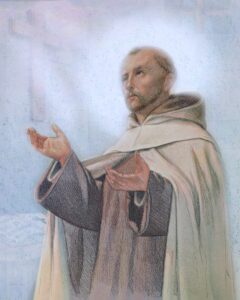 The purification that St. John of the Cross called a “dark night of the soul” has three stages, which he here describes:
The purification that St. John of the Cross called a “dark night of the soul” has three stages, which he here describes:
“This purification of the soul … we can call the dark night…, whether it is the purification of the sense or of the spirit.” (1)
“A soul must ordinarily pass through two principal kinds of night (which spiritual persons call purgations or purifications of the soul) in order to reach the state of perfection. Here we shall term these purgations nights, because in both of them the soul journeys in darkness as though by night.
“The first night, or purgation … concerns the sensory part of man’s nature. The second [night is] the night of the spiritual part of man’s soul. [The third night is] the passive purgation.
“[The] first night is the lot of beginners, at the time God commences to introduce them into the state of contemplation…. The second night or purification takes place in those who are already proficients, at the time God desires to lead them into the state of divine union. This purgation, of course, is more obscure, dark, and dreadful.” (2)
“[The first] dark night is a privation and purgation of all sensible appetites for external things of the world, the delights of the flesh, and the gratifications of the will. All this deprivation is wrought in the purgation of sense. … One is not freed from the sufferings and anguish of the appetites until they are tempered and put to sleep. … The first [reason we call this journey toward union with God a night] has to do with the point of departure, because the individual must deprive himself of his appetite for worldly possessions. This denial and privation is like a night for all his senses.” (3)
“After passing through the first night (the privation of all sensible objects), a man soon enters the second night by living in faith alone, not a faith that is exclusive of charity, but a faith that excludes other intellectual knowledge. … For faith does not fall into the province of the senses. … God, by means of faith, which is the second night, communicates Himself so secretly and intimately that He becomes another night for the soul.” (4)
“While this communication of God is in progress, the night … becomes far darker than those other two nights. When this third night (God’s communication to the spirit, which usually occurs in extreme darkness of soul) has passed, a union with the Spouse, who is the Wisdom of God, (5) then follows. … In actuality these three nights comprise only one night, a night divided into three parts, just as the natural night. The first part, the night of the senses, resembles early evening, that time of twilight when things begin to fade from sight. The second part, faith, is completely dark, like midnight. The third part, representing God, is like the very early dawn just before the break of day.” (6)
Footnotes
(1) St. John of the Cross in Kieran Kavanaugh and Otilio Rodriguez, trans. Complete Works of St. John of the Cross. Washington: Institute of Carmelite Studies, 1973, 71-2. [Hereafter CWSJC.]
(2) CWSJC, 73.
(3) Ibid., 74.
(4) Ibid., 75.
(5) This Wisdom is the Holy Spirit, a part of the Divine Mother. She says: “Sometimes you tend to think of me as the Holy Spirit, but there is more to me than that, and there is a shade of the Father within there as well. But I am known by the movement within you and the movement within your Earth, within all things, within all universes. ” (“The Divine Mother: Come to Me as I Come to You – Part 1/2,” Oct. 17, 2012 at http://goldenageofgaia.com/2012/10/17/the-divine-mother-come-to-me-as-i-come-to-you-part-12/.)
(6) St. John of the Cross in CWSJC, 75.

